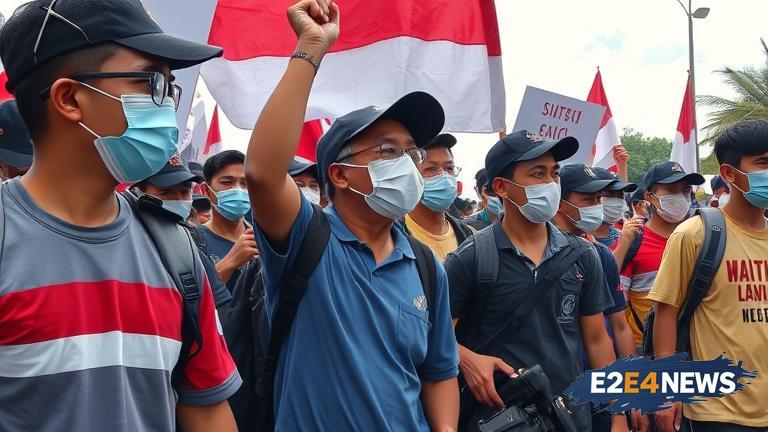A recent protest in Jakarta, Indonesia, has brought attention to the growing discontent among the country’s youth regarding the government’s decision to increase lawmakers’ allowances. The protest, which took place in the nation’s capital, saw a large turnout of young individuals, with reports suggesting that over 300 people were detained by authorities. The majority of those detained were minors, sparking concerns about the treatment of young people in the country. The protest was organized in response to the government’s decision to increase the allowances of lawmakers, which has been met with widespread criticism. Many have argued that the move is unjust, particularly given the country’s current economic climate. The protesters, who were largely made up of students and young workers, called for the government to reconsider its decision and prioritize the needs of the people over those of lawmakers. The demonstration was peaceful, with protesters holding signs and banners, and chanting slogans. However, the situation took a turn when authorities intervened, detaining many of the protesters. The use of force by authorities has been condemned by human rights groups, who argue that it is unacceptable to detain minors and peaceful protesters. The incident has sparked a wider debate about the state of democracy in Indonesia, with many calling for greater transparency and accountability from the government. The country has a long history of student-led protests, which have often been instrumental in bringing about change. The current protest is seen as a continuation of this tradition, with young people taking to the streets to demand a better future. The government has defended its decision to increase lawmakers’ allowances, arguing that it is necessary to ensure the effective functioning of the government. However, this argument has been met with skepticism by many, who point out that the move will only serve to further entrench the country’s elite. The protest has also highlighted the growing disconnect between the government and the people, with many feeling that their voices are not being heard. The use of social media has played a significant role in the protest, with many using platforms to organize and mobilize. The hashtag #TolakTunjangan, which translates to #RejectAllowance, has been trending on Twitter, with many using it to express their opposition to the government’s decision. The protest has also received support from opposition parties, who have called for the government to reconsider its decision. The incident has sparked a wider conversation about the role of young people in politics, with many arguing that they should be given a greater voice. The government has announced plans to review the decision, following widespread criticism. However, it remains to be seen whether this will be enough to address the concerns of the protesters. The protest has also highlighted the need for greater transparency and accountability in government, with many calling for more to be done to address corruption and inequality. The country’s president has called for calm, urging protesters to engage in dialogue with the government. However, many remain skeptical, arguing that the government is not genuinely committed to listening to the concerns of the people. The protest has also sparked a wider debate about the state of the economy, with many arguing that the government’s priorities are misplaced. The country is currently facing a number of economic challenges, including a growing trade deficit and rising unemployment. The government has announced plans to address these challenges, but many remain unconvinced. The protest has also highlighted the need for greater investment in education and healthcare, with many arguing that these should be the government’s top priorities. The incident has sparked a wider conversation about the role of the government in society, with many arguing that it should be more accountable to the people. The use of force by authorities has been widely condemned, with many arguing that it is unacceptable to detain peaceful protesters. The government has announced plans to investigate the incident, but many remain skeptical. The protest has also sparked a wider debate about the state of human rights in Indonesia, with many arguing that the government is not doing enough to protect the rights of its citizens. The country has a long history of human rights abuses, and many argue that the current government is not doing enough to address these issues. The incident has sparked a wider conversation about the need for greater transparency and accountability in government, with many arguing that this is essential for building trust and ensuring that the government is truly accountable to the people.
